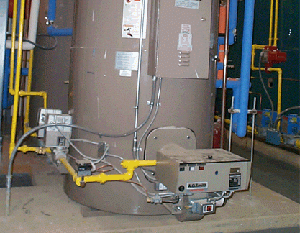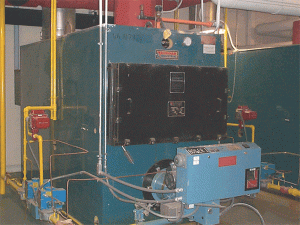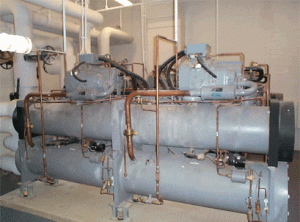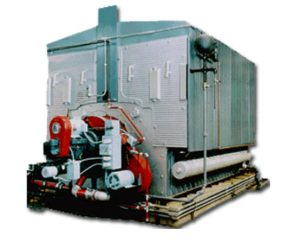Boiler Basics
Knowing the types of Boiler objects
Typical Water Heater

Typical Fire Tube Boiler

Typical Twin Bank Chiller

Typical Cast Iron Boiler

My Boiler won’t start – what to do first? Nothing can be more frustrating than a nonfunctioning boiler on a cold day. Fortunately, noticeable changes in boiler performance precede most mechanical failures. If you notice a change in boiler performance such as new noises, smells, rising stack temperatures or continually resetting safety devices, call your boiler professional for help. Although unexpected mechanical failures do occur, it is likely that one of the boiler’s safety or operational devices is preventing your boiler from starting. Most safety devices have manual reset buttons that need to be reset before boiler operation can continue. Continual resetting of safety devices is an indication of unsafe operating conditions. Prompt attention by your boiler technician is required.
Locate all devices that can prevent your boiler from starting to include:
- Burner controller: The controller is usually located in front of the burner. On a call for heat the controller starts a sequence of events that ensure safe operation before the burner is allowed to start. The controller continues to monitor burner operation while the boiler is running. If for any reason the controller senses an unsafe operating condition it will shut the burner off. Pushing the manual reset on the controller will often restart the boiler.
- High pressure or temperature switch: This device is a safety backup to the “operator” control. It has a manual reset which when pressed to start the boiler indicates that the “operator” control has failed.
- Gas pressure switches on the fuel train: The natural gas fuel train usually has two pressure switches. The low pressure switch locks out the boiler when too little gas is available for operation. The high pressure switch locks out the boiler when the regulator is allowing too high a gas pressure. Both switches have a manual reset.
- Low water cutoff: The low water cutoff may have a manual reset. When reset indicates a low water condition existed in the boiler.
Other devices that may prevent the boiler from starting:
- Time clocks: – Time clocks or other energy management devices may restrict boiler operation during weekends, evenings or other times of the day. Check their operating schedule.
- Outdoor temperature limits: – These devices sense outdoor temperatures and prevent boiler operation above certain outdoor temperatures, usually 65 degrees.
If resetting these devices does not start your boiler call your boiler professional for assistance.
Reminder: Do not bypass any safety devices in an effort to start your boiler.
Causes of Boiler Room Accidents
Boiler systems are designed for safety and efficiency. The key to safe boiler operation is the operator. Armed with some basic knowledge about boiler systems and maintenance the boiler operator can ensure years of safe, reliable service.
History has shown that without proper operation and maintenance, boiler conditions and safety deteriorate, causing potential hazards due to neglect and misunderstanding.
Routine maintenance is well within the ability of most boiler operators. Boiler tune up and repairs however are best left to trained professionals. Understanding when to turn to qualified professionals for assistance is an operators first responsibility.
Here are some problem areas where trained professionals are needed:
- Leaking pressure relief valves
- Continuous make up water to boiler
- Steam leaks or steam vented from condensate tank (steam systems)
- High stack temperatures (greater than 350 degrees)
- Insufficient heat to building
- Condensate dripping down stack or out the front of the boiler
- Constantly resetting controller, high pressure or temperature limits or low water cut off switches
Common Boiler Room Accidents
Dry Fire Accidents: Dry fire accidents are also called boiler meltdowns. These accidents occur when the boiler is allowed to operate without adequate water in the boiler. Functioning low water cutoffs are essential to preventing dry fire accidents. Boiler damage can run from severe buckling and deforming of the boiler to complete meltdown or potential boiler explosion.
Excessive Pressure Accidents: Excessive pressure is potentially the most lethal form of boiler accident. These accidents occur when the boiler can no longer contain the excessive pressure allowed to build in the boiler. The operator control, high pressure limit, and the pressure relief valve need to fail before these accidents can occur. Excessive pressure accidents, even in small boilers, have been known to completely destroy a building.
Fuel Related Accidents: Fuel related accidents usually occur when the operator fails to purge combustible gases from the fire box before ignition is attempted.
Leaking fuel valves can also be the cause of these accidents. If the operator notices any gas odor the boiler should be shut down and the fuel supplier called immediately.
Water Treatment Basics
Boilers are filled with water that contains naturally occurring impurities. Common impurities such as calcium, magnesium and oxygen can, if they are not controlled, effect boiler performance and durability.
All water contains dissolved minerals such as calcium and magnesium. If these minerals are allowed to reach high enough levels in the boiler water they will come out of solution and form as a hard shell on the hot surfaces of the boiler. This hard shell is called scale and is often found on the outside of the fire tubes. Scale insulates the heating surfaces reducing the ability of the fire tubes to transfer heat from the hot combustion to the boiler water. High stack temperatures or ruptured fire tubes are common problems related to scale build up.
Boiler water also contains dissolved gases such as oxygen or carbon dioxide. These gases in the presence of water and metal can cause corrosion. Corrosion eats away the metal effecting the durability of the boiler.
Water treatment strategies:
Boiler heating systems lose water through steam and water leaks. Additional water called “makeup water” is added to the boiler to replace these losses. The amount of make up water and the level of naturally occurring impurities in the water will determine the type of water treatment required. Boiler heating systems that have very few leaks will require simple water treatment programs. Your boiler inspector or water treatment professional can assist you in developing a water treatment program. Steam and hot water boilers typically require different water treatment programs.
Steam boilers:
Steam boilers are usually treated to prevent scale and corrosion. Scale producing dissolved minerals accumulate in the boiler water when mineral rich make up water replaces mineral free steam and condensate leaks. Strategies to prevent scale attempt to keep the components of scale such as calcium and magnesium suspended in the boiler water or to reduce their concentrations in the boiler water. Draining water from the boiler (bottom blowdown) is a common method for reducing the concentration of solids and to discharge sludge.
Corrosion is reduced by adding oxygen scavenging chemicals to the boiler water. Boiler water testing is required to ensure that conditions suitable for scale and corrosion are not present.
Hot water boilers:
Scale build up is usually not a problem in hot water boilers. Although make up water contains dissolved minerals, system leaks discharge water with an equal amount of dissolved minerals. Since as many minerals are leaving the boiler system as enter it; minerals do not have the opportunity to accumulate in the boiler water.
Corrosion remains a problem so oxygen scavenging chemicals are added to address the problem.
Note: Provided and posted with permission courtesy of State of Oregon Boiler Program staff.
